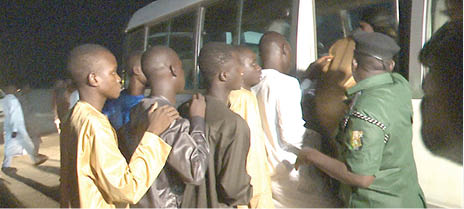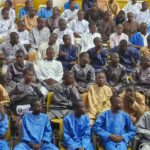Sixteen-year-old Usman Pato is trying to navigate life after a harrowing three months ordeal in detention. His story serves as a sobering reminder of the human cost of injustice and the resilience required to overcome it.
The Kano resident was among the 76 individuals rounded up by the police amidst a wave of protests against high cost of living and calls for an end in bad governance across Nigeria in August 2024.
Pato and dozens of others were charged with 10 felony counts that included treason, destruction of property, mutiny and public disturbance by the Nigerian government. A treason charge, upon conviction, carries severe consequences that could lead to death penalty.
Though freed as a result of the uproar that greeted their arraignment in November 2024, the 16-year-old said that three months in detention did not only expose him to the harsh realities of the Nigerian criminal justice system but also left scars that may never fully heal.
- Rumpus in First Bank as shareholders move against Otedola
- Trump sentenced to ‘unconditional discharge’ over hush money
On the day he was picked up by security agents, Usman Pato said he had been sent to buy a recharge card. When he saw people running in different directions, he became confused. “That was how the law enforcement agents arrested me and took me to the state Criminal Investigation Department (CID) of the Nigeria Police Force,” he said.
After two days in custody, Pato said he was allowed to contact relatives to inform them that he had been arrested. However, when they arrived at the station, they were told that he was being accused of committing a capital offence and had to be transferred to Abuja.
Abba Adamu, another teenager who spent 93 days behind bars, has returned to a life different from the one he knew. Once in the construction business, Adamu now finds himself hawking flip-flops in the streets of Kano. His arrest, which cost him his job, savings and family property, has left deep scars.
“My mother sold her land and livestock to get me out of custody,” he said, adding that after their release, the government promised financial capital to enable them start a business, a promise that has not been redeemed.
Speaking on how he found himself in detention, Adamu explained that he was at home on the day of the protest and only stepped out when the curfew was relaxed to buy construction materials. But he was arrested by the police around the market.
“I was not part of the protest, let alone those who raised the Russian flag. It was when I was arrested and taken to the police station that I was asked to raise a flag, which I refused,” he insisted.
Before his arrest, Adamu was the family’s breadwinner, but now, he struggles for survival while hawking flip-flops.
“My parents reached out to my friend’s elder brother for assistance and he asked me to come and get some flip-flops to sell, which I started hawking recently,” he said.
The arrest of Usman Pato and Abba Adamu was in connection with the August 2024 #EndBadGovernance protest, which had Nigerians across the country voicing their frustration over the high cost of living and corruption in the country.
After three months in detention, the teenagers were among a group of malnourished looking minors who were later arraigned in court. Their poor appearance drew condemnation from both citizens and civil society groups, who accused the government of unlawfully detaining children and subjecting them to appalling conditions.
But Rimazonti Ezekiel, counsel to the government, attempted to downplay the presence of minors in court, insisting that the suspects were “married men” and those seen around the court were only there to greet their relatives. However, many Nigerians were not convinced. And human right groups criticised the government for mixing underage children with hardened criminals and failing to respect their basic rights.
The executive director, Civil Society Legislative Advocacy Centre, Awal Musa Rafsanjani, described government’s attitude as depicting lack of respect for human rights. He questioned the condition of living of the children while in detention.
After intense public pressure, the federal government eventually dismissed the charges against Usman, Abba and others. The government promised rehabilitation, including the payment of school fees for those who were attending school before their arrest, and financial assistance for those interested in starting businesses. However, two months later, little has been done to fulfill these promises.
Nura Sani, Usman’s brother, said the government had not followed through. “What they promised was to pay their school fees, but none of that has happened. Those who were supposed to receive capital to start businesses have not received anything,” he said.
Similarly, Nura Ahmed Mohammed, the chairman of the Parents Association of the detained minors, said the only assistance provided so far was the payment of their medical bills.
“We submitted the documents for the students’ school fees to the commissioner for education in Kano, but we have not received any feedback yet,” Mohammed said.
For Usman and others like him, the impact of their detention is far from over. While they may have been physically freed, the psychological scars may linger for years.
Usman’s brother, Nura Sani, noted disturbing changes in his brother’s behaviour since his release, saying, “Now, he stays out longer than necessary when sent on errands. There are times he goes to places far away and later tells us where he went.”
He, however, said they had been asked to lodge a complaint with the government about his strange behaviour so as to get medical care.
The aftermath of the #EndBadGovernance protests, unlike previous national uprisings, has failed to bring any tangible change as prices of basic food items continue to soar and cost of living remains unbearably high for millions of Nigerians.
Dr Hussaini Abdu, a political economist, noted that since colonial times, Nigeria’s response to protest had been arrest and detention. He pointed out that even after the outcry over the arrest of minors, many others remain imprisoned at the state level.
“What many Nigerians don’t know is that there are still many of these children in different detentions at state levels. A lot of them have not been released,” he said.
Abdu urged the government to find more constructive ways to address citizens’ grievances, saying that while the government may acknowledge the hardship faced by the people, it is yet to take a meaningful action to alleviate the situation.
The 2024 #EndBadGovernance protest was by no means Nigeria’s first outrage. For years, tensions have been building. On January 1, 2012, then President Goodluck Jonathan had to deal with two weeks of protests tagged “Occupy Nigeria.” The protests followed attempts to remove fuel subsidy. The price of fuel at the time was increased from N65 per litre to N141.
By 2020, another round of protests demanded an end to police brutality. The EndSars protests, led by the youth, focused on curbing the excesses of the Nigeria Police Force.
Also, the infamous Lekki toll gate incident still lingers in the minds of many Nigerians.
President Bola Ahmed Tinubu’s declaration of the removal of subsidy on petrol sparked a chain of reactions. First, panic-buying and long queues at filling stations surfaced, then the prices of goods skyrocketed. The ripple effect of inflation spared no one, following which high cost of living ignited citizens into a nationwide protest.
According to the Permanent Secretary, Kano Ministry of education, Bashir Baffa Muhammad, all affected children have been sent back to school, according to the instruction of the Governor.
The Permanent Secretary, who spoke through the Public Relations Officer of the ministry, Balarabe Abdullahi Kiru, said, “All those minors have successfully been returned back to their schools, and those that were not going to school have been registered into various schools. They are all back to schools as instructed by the Governor.”

 Join Daily Trust WhatsApp Community For Quick Access To News and Happenings Around You.
Join Daily Trust WhatsApp Community For Quick Access To News and Happenings Around You.


